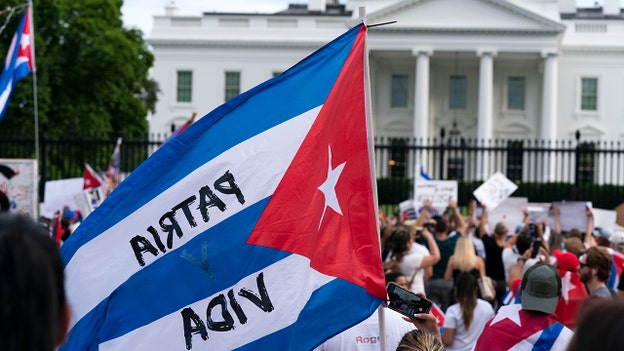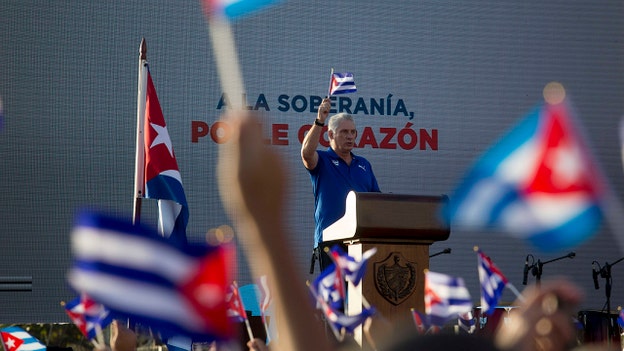LIVE UPDATES: Cuba protests continue in US as Cuban leaders gather supporters in Havana
Protests against Cuba's government were held in Washington, D.C., Miami and other cities on Saturday while Cuban leaders rallied supporters in Havana a week after rare and massive antigovernment protests broke out in the country.
Coverage for this event has ended.
Washington Post political investigations reporter Toluse Olorunnipa observed that Democrats don't want to "go hard" on Cuba because they are being influenced by the more progressive members of their party who "agree" with many of the struggling country's socialist policies.
In recent days Cuban protesters have expressed anger over rising prices, shortages of goods and poor health care amid the COVID-19 pandemic.
"They are really being led by the progressive wing of the Democratic Party, and the progressive wing does not want to go hard against Cuba, against some of the things that the Castro regime may have been a part of it," Olorunnipa argued on CNN's "Inside Politics" Sunday.
Gloria Estefan has become the latest celebrity to speak out about the recent protests in Cuba.
On Friday, the three-time Grammy winner took to Instagram to call on the United States and other international democratic countries to aid the Cuban people.
"My heart hurts for the Cuban people on the island & what they’ve already gone through for over 62 years. … But now they are saying ENOUGH," the singer wrote. "Despite the beatings, the murders & incarcerations, the abuses of power, the starvation & the attempted destruction of their spirits! They need our support & that of the democratic & free countries of the world."
Cartoonist and graphic artist Wimar Verdecia attended Sunday's march, noting the number of young protesters.
"All young people want to migrate because it's a country where there is no future, where you can't think of a prosperous and dignified life," Verdecia said told The Guardian.
Another protester, who gave the name Ana, was part of a protest that reached the El Capitolio in Havana.
"We also felt the presence of the quick response brigades," Ana said. "They are state security but are dressed as civilians. They were first to provoke."
Gregory Biniowsky, a Canadian lawyer and long-time resident of Cuba, said of the protests, "In truth I'm surprised it took so long."
The Biden administration this week warned Cubans attempting to enter the U.S. by boat that they would be turned back or sent to a third country -- all while tens of thousands of migrants arriving at the southern border are being let in.
"Allow me to be clear. If you take to the sea, you will not come to the United States," Department of Homeland Security Secretary Alejandro Mayorkas said this week about migrants from Cuba and Haiti coming across the Florida Straits.
As political protests against the authoritarian communist regime rock the country, there are fears of a spike in migrants fleeing. Mayorkas said DHS has not yet seen a surge, but warned that those coming over would not come in -- but could be referred to a third country.
Thousands of supporters of Cubans protesting their Communist regime gathered in downtown Miami Saturday to call for democracy in the country.
The Florida rally came a week after Cubans rose up in a rare display of defiance against the government.
“I think that the monumental voice, the platform of social media that they tried to dim down by taking away the internet, I think that’s bringing awareness that we haven’t seen before,” protester Caridad Rodriguez told WSVN-TV in Miami. “We’ve heard these stories, but now we’re seeing what is happening over there.”
Hundreds of protesters demonstrating against Cuba's government Saturday gathered outside of the White House and the Cuban embassy in Washington, D.C., according to the Miami Herald. The group had taken an overnight bus from Miami to make their voices heard in the nation's capital.
They chanted: “Joe Biden do your job” and “Joe Biden, Cuba needs your help.”
Cuban officials rallied tens of thousands of supporters in the streets on Saturday — nearly a week after they were stunned by the most widespread protests in decades.
President Miguel Díaz-Canel— accompanied by 90-year-old former President Raul Castro — appeared on the seafront Malecon boulevard that had seen some of the largest protests against shortages and the political system the previous weekend.
He made an impassioned speech blaming unrest on the U.S. and its economic embargo, “the blockade, aggression and terror,” as a crowd waved Cuban flags and those of the July 26 Movement that Fidel Castro led during Cuba's revolution.
Live Coverage begins here

